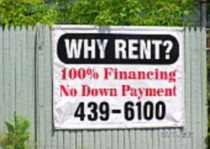SAFEGUARD Advisers
Stock Market vs Real Estate Investing
The article points out that most Wall Street bankers, brokers and financial planners are guilty of distorting reality, at best, and outright deceit, at worst, when comparing the performance of the stock market vs the housing market.
False Comparison
The numbers that are generally compared are stock gains against home appreciation, and quite naturally stocks appear to perform better. Why? Because the comparison is between a stock investment that has the potential of producing income…and a home in which there is no potential at all of earning income? It’s what as known as an “apples to oranges” comparison.
…the Wizards of Wall Street must create distortions and deceit in order to scare people away from real estate. After all, their fees and commissions are at risk.
Cold, Hard Facts
The Dow Jones Industrial Average, over a 12 year period from Sept 10, 1999 to Sept 9, 2011, went from 10,462 to 10,992. That’s 530 points…representing a 5% total gain. So, a $100,000 investment would have produced a $5,000 gain…$417 per year or .4%. (Most investors actually lost 20% or more during this 12 year period.)
What about investment real estate over these same 12 years? Using the national average of 10% of value for gross rent for a typical $100,000 home ($1000 per month), subtract 25% for expenses (primarily taxes and property management) and the net rent is about $750 or a $9,000 annually. (Vacancy rates and maintenance aren’t factored in, but neither are rental increases, appreciation or re-investment of profit, which would more than offset those expenses.)
Multiply the annual net rent of $9,000 and over the 12 year period, you would have a total gain of $108,000, or 108% (9% annually).
Bottom Line
…what if the value of the property actually falls? What then? To start with, the yield would still be the same – $108,000. Then, you would just sit back and wait for the value to rise again…it always has and always will.
Bottom Line: Stock Market gains of $5,000 vs Real Estate gains of $108,000.
Read entire article: Stock Market vs. Real Estate Investing
********************
Coach Mitch’s REFLECTIONS™
False Question
The Stocks vs. REI is a False Comparison, it is also a False Question.
The Real Question: Active vs. Passive Investing
As an investor, which do you want to do? Do you want to be an active investor or do you want to be a passive investor?
A passive investor is one where you give your money to someone else and let them manage it. You hope for a good outcome but you have no input into any decisions. Typical passive investments are stocks, bonds, annuities, limited partnerships, etc.
I believe that the main reason someone does passive investing is that they don’t want to be involved, they just want to open the newspaper, look at the stock price and be happy. If the price is down they can be grumpy, which is fine with them because most folks are very happy when they are grumpy.
An active investor is one where you are actively involved in the investment. You make the decisions about how your money is being spent. This means that decisions are up to you. You are responsible, no matter what happens, good or bad, up or down. The typical investment is some sort of enterprise, a restaurant, a service business, like insurance or stock brokering, or real estate investing.
Real Estate Investing can be passive
If you were to give your monies to a firm that manages property and leases, e.g. a T.I.C. or Tenants In Common. You put up the monies, the property management firm purchases and manages the property, you get your share of the profits, often about a ten percent ROR or a 10 Cap, Capitalization Rate.
REIT’s or Real Estate Investment Trust’s are also a passive real estate investment. You buy stock or a bond in the real estate investing company, they buy and manage the properties and you get your share of the profits via dividends.
Real Estate Investing is active
You, dear reader, are probably seeking to be an active real estate investor. Bravo! I believe that real estate investing for one’s portfolio is the very best way to move yourself forward. The reason is that, in real estate you have almost total control over the investment. This is not so in any other active business that I know of.
Other active businesses
Gold, jewels, cars, antiques, paintings, etc. All collectables businesses probably started out as a being a hobby and morphed into a business. You must become an expert in your field or you will be easily taken advantage of. However, the reality is that you have no control over the marketplace. You sometimes buy at wholesale, but often you must buy at retail, and you almost always have to sell at wholesale or at firesale. You have to become an expert in your field because the money is in the expensive investment grade pieces. And, you need all cash. There is no leverage.
Often a franchise is a good way to being in your own business. However, it is not usually as much an investment as it is just another job. Example: the last I knew, a Subway restaurant will cost a $10000 franchise fee, which is cheap enough, however the start up costs are $100-$200K, to outfit the restaurant and do start-up marketing. After expenses you can make up to $70000, but, at that point, Subway will build another unit just down the road, making sure that you go back to making about $35000 net after taxes.
Knowledge Creates Opportunity with Control and Leads to Profit
First, the presumption is that you are constantly informing yourself about the marketplace. The best thing about real estate is that it offers the long lead times necessary to investigate a situation prior to investing to be sure that you want to invest and in what manner. Long lead times also allow you to be able to react to that situation by selling or by being offensive or defensive in some way. Perhaps you increase marketing to gain market share or you may layoff personal to cut costs.
Example: You read in the newspaper that a new highway exit is planned to relieve traffic.
Bad – if you had a Subway and the exit would move traffic away from your location, then you have time to sell the franchise to someone who does not know about the planned exit.
Good – if you wanted a Subway, knowing that the planned exit will dramatically lower business, you can make a very low offer for an existing Subway or conversely seek some other business that will still prosper because of the good location even with lesser traffic and get it at a lower price because of the perception that traffic will lower, such as a professional office building or some business that people will travel to because it is a destination, e.g. a miniature golf course.
Other good reasons for investing in real estate
Banks or private lenders will fund real estate transactions, at competitive rates and with creative terms; not so with collectables, sometimes with businesses. Therefore, with real estate, you don’t need lots of your own cash as credit is readily available, and 80% of commercial transactions have some level of owner financing. The law surrounding real estate transactions is well established, and there are plenty of professionals available to help us. We are all innately familiar with real estate because we grew up in it. Real estate is very logical and we can teach ourselves what we need to know fairly easily.
Tax Delinquent Property
The reasons I believe that investing in tax delinquent property is a very good way to invest in real estate is that you are dealing with a huge database of motivated sellers. Every person that has not paid their property taxes has one thing in common – they all are hurting, or they would pay their taxes.
The database is so large that you have to narrow it down just to get manageable number of leads to investigate. You can also limit your efforts to those properties that are free and clear of liens. These folks are “the most motivated of all motivated sellers,”™because the tax auction sale is approaching and if the property is auctioned, they will get nothing, so the sellers are very approachable and will listen.
Willing and Able™
Tax delinquent sellers are willing to give a good deal because they are behind on the taxes and haven’t been able to solve their financial problem. If you can figure a way to give them what they need and still make a profit, then you have the potential to make a great transaction because the property is free and clear and the seller is able to lower the price as much as they feel they must. Only in tax delinquent property are sellers willing and able to do such great deals.
Example: You examine the tax delinquent list, looking one mile past where the exit will be built and find vacant land. Right now it has little value, and an anxious owner, so you can control it with Coach Mitch’s “famous $1 Option.”™ at at low amount, just $1. Develop the land or sell the land, either provides for a great profit.
OR, you can look for a tax delinquent parcel that has an existing business, is located past the future exit and make your best deal. Look for a person that wants to retire, come to an agreed price, based upon today’s traffic. Have the owner finance your purchase and seek to provide him a stable monthly income. Help manage the business to learn it until you buy the business – just in time for the exit to be built and for you to take advantage of the higher traffic.
Result
You read a newspaper gathering Knowledge; you created an Opportunity; you Controlled the deal by only dealing with certain situations that you planned; you Profited. That is control. You won’t get it giving your money to a stockbroker.
<>10 Ways Tax Delinquent Property Is An Extraordinarily Profitable System.
G-D Bless U.S.








Leave a Reply